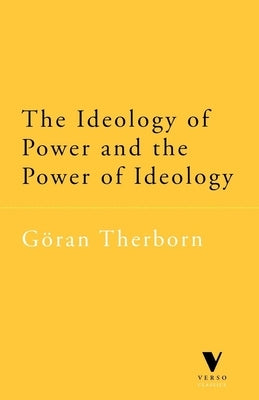Description
Few concepts have been so intensively discussed or so widely sponsored as that of "ideology." Whether read as the expression of social classes or attributed a material independence and efficacy, whether devalued as false and non-scientific or asserted as the necessary element of social practice, "ideology" has become an ineluctable conceptual reference across a range of works dealing with subjects as varied as science and politics, gender and cultural production. In this book, G ran Therborn makes a decisive contribution to the contemporary debate. Beginning with some critical reflections on Louis Althusser's influential writings in the late sixties, Therborn develops a theory of the formation of human subjects. He then goes on to consider the material matrix of ideologies and the problem of ideological change, the ideological constitution of classes and the characteristics of the discursive order that regulates it. Turning to questions of state power and political struggle, Therborn provides a remarkable account of ideological domination that displaces traditional categories, and a fascinating analysis of the process of political mobilization. Brief yet wide ranging, probing yet succinct, The Ideology of Power and the Power of Ideology is a work of theoretical exploration that establishes new bearings for the current discussion of ideology.
Author: Goran Therborn
Publisher: Verso
Published: 07/17/1999
Pages: 144
Binding Type: Paperback
Weight: 0.43lbs
Size: 8.51h x 5.35w x 0.54d
ISBN13: 9781859842126
ISBN10: 1859842127
BISAC Categories:
- Social Science | Sociology | General
Author: Goran Therborn
Publisher: Verso
Published: 07/17/1999
Pages: 144
Binding Type: Paperback
Weight: 0.43lbs
Size: 8.51h x 5.35w x 0.54d
ISBN13: 9781859842126
ISBN10: 1859842127
BISAC Categories:
- Social Science | Sociology | General
About the Author
Göran Therborn holds the Chair of Sociology at the University of Cambridge, and is editor and author of Inequalities of the World, Asia and Europe in Globalization, Between Sex and Power and From Marxism to Post Marxism?

